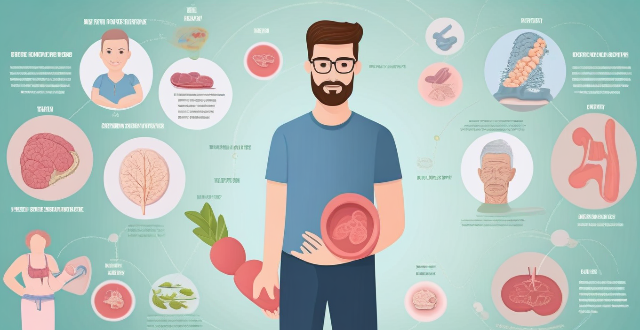Better Mental

How does physical exercise contribute to mental well-being ?
The text discusses how physical exercise contributes to mental well-being by releasing endorphins, boosting self-esteem, improving sleep quality, facilitating social interaction, and enhancing cognitive function. Regular physical activity can lead to long-term improvements in mental health, including reduced stress, anxiety, and depression, as well as better emotional stability and overall mood. Engaging in group sports or exercise classes provides opportunities for social interaction, which is essential for mental well-being, while achieving fitness goals can boost self-esteem and self-confidence. Better sleep patterns from exercise can lead to improved cognitive function and emotional regulation, while enhanced cognition may aid in the management of mental health conditions. Incorporating regular physical activity into your routine can promote mental well-being through these various mechanisms.

How can I teach my child better concentration habits ?
Concentration is an essential skill for children to develop as it helps them focus on tasks, learn new things, and achieve their goals. Teaching your child better concentration habits can be challenging, but with patience and consistency, you can help them improve their ability to pay attention and stay focused. Here are some tips to teach your child better concentration habits: 1\. Set Clear Expectations: Establish clear expectations for your child's behavior and concentration levels. Make sure they understand what is expected of them and why it is important. 2\. Create a Distraction-Free Environment: Minimize distractions in your child's environment to help them concentrate better. Turn off the TV, put away toys or electronic devices, and ensure that there are no loud noises or interruptions during study or task time. 3\. Break Tasks into Smaller Chunks: Breaking down tasks into smaller, more manageable chunks can help your child stay focused and avoid feeling overwhelmed. 4\. Use Visual Cues: Visual cues such as checklists or charts can help your child stay organized and focused on their tasks. 5\. Encourage Short Breaks: Encourage your child to take short breaks between tasks to recharge their mental batteries. A five-minute break every hour or so can help them maintain focus and avoid burnout. 6\. Practice Mindfulness Techniques: Mindfulness techniques such as deep breathing exercises or meditation can help your child develop better concentration habits. 7\. Praise Effort and Progress: Praising your child's effort and progress can motivate them to continue working towards better concentration habits. Acknowledge their accomplishments and encourage them to keep pushing themselves to improve.

What is the importance of mental health in overall personal well-being ?
The text discusses the importance of mental health in overall personal well-being. It explains how good mental health can lead to better physical health, emotional stability, healthy social relationships, workplace productivity, and an improved quality of life. The article emphasizes the need for prioritizing mental health by seeking professional help when needed, practicing self-care, and engaging in activities that promote good mental health.

Why is it a mistake to believe that more exercise automatically leads to better health ?
The belief that more exercise automatically leads to better health can be a mistake due to several reasons such as overexertion and injury risk, neglect of other aspects of health, cardiovascular strain, hormonal imbalances, and mental health impact. It is important to recognize that more is not always better and a balanced approach that incorporates appropriate amounts of exercise along with attention to nutrition, rest, and overall wellness is key to achieving optimal health outcomes.

Can physical activity improve mental health ?
Physical activity has been found to significantly improve mental health by enhancing self-efficacy and stress self-management skills. Research shows that engaging in physical activities can lead to a sense of accomplishment, boosting an individual's confidence in their abilities, which in turn fosters better stress management and contributes to enhanced mental well-being. This relationship is particularly important for adolescents, a demographic vulnerable to mental health challenges. Future research should focus on identifying specific types of physical activities that have a greater potential to enhance these skills, guiding the development of targeted interventions aimed at improving mental health through physical activity.

How does exercise improve mental health ?
The article discusses how exercise improves mental health by reducing symptoms of depression and anxiety, improving mood, and enhancing cognitive function. It highlights the release of endorphins, regulation of neurotransmitters, stress reduction, increased energy levels, better sleep quality, enhanced self-esteem, improved memory and attention, reduced risk of cognitive decline, and promotion of neuroplasticity as mechanisms through which exercise positively impacts mental well-being. The conclusion emphasizes the importance of regular physical activity for overall well-being and advises consulting a healthcare professional before starting any new exercise program.

How can educational psychology aid in addressing students' mental health issues ?
Educational psychology can aid in addressing students' mental health issues by understanding the role of emotional intelligence, promoting a positive school climate, providing early intervention and support services, encouraging self-care and resilience, and facilitating collaboration between educators and mental health professionals.

How does exercise contribute to mental rejuvenation ?
Exercise plays a crucial role in mental rejuvenation by releasing endorphins, improving blood flow, enhancing neuroplasticity, reducing stress, improving sleep quality, facilitating social interaction, and boosting self-esteem. Regular physical activity can significantly contribute to improved cognitive functions, emotional stability, and overall mental well-being.

What role does physical exercise play in boosting mental focus ?
Physical exercise is not only beneficial for our physical health, but it also plays a crucial role in enhancing mental focus. Here's how: 1. Release of Endorphins: Regular exercise triggers the release of endorphins, which can help reduce stress and anxiety, leading to improved mental clarity and focus. 2. Increased Blood Flow to the Brain: Engaging in physical activities increases blood flow to the brain, delivering more oxygen and nutrients. This increased blood flow can help improve cognitive function, memory, and overall mental sharpness. 3. Better Sleep Quality: Exercise has been shown to promote better sleep quality and duration. Adequate sleep is essential for maintaining mental focus and concentration throughout the day. 4. Reduction of Stress and Anxiety: Physical activity helps lower levels of the body's stress hormones, such as cortisol. By reducing stress and anxiety, exercise allows individuals to maintain a clearer mind and stay focused on tasks at hand. 5. Enhanced Self-Confidence and Mood: Regular exercise can boost self-esteem and confidence, leading to a positive outlook on life. A positive mindset contributes to better mental focus and productivity. 6. Improved Cognitive Function: Studies have found that regular physical exercise can lead to improvements in various aspects of cognitive function, including attention, memory, and executive functions. These cognitive enhancements directly contribute to increased mental focus and concentration.

Are there specific exercises that help improve mental health ?
Exercises like yoga, meditation, aerobic exercise, resistance training, MBSR, and Tai Chi can help improve mental health by reducing stress, anxiety, and depression symptoms while promoting relaxation, self-awareness, and social interaction.

What is the relationship between exercise and mental health ?
Exercise has a profound impact on mental health, enhancingExercise has a profound impact on mental health, enhancing reducing stress, improving sleep quality enhancing mood and cognitive function, reducing stress, improving sleep quality, and fostering social interaction. Regular physical activity stimulates the release of neurotransmitters like endorphins, serotonin, and dopamine, leading to improved mood, relaxation, and better cognitive abilities. It also helps manage cortisol levels, promotes deeper sleep, and provides emotional support through group activities, ultimately contributing to overall mental well-being.

How can mental training improve physical abilities in athletes ?
Mental training is crucial for athletes as it enhances physical abilities by improving focus, managing stress, and promoting a positive mindset. Techniques such as visualization, self-talk, and emotional intelligence contribute to better performance.

In what ways does mental health support impact overall women's health ?
This text discusses the importance of mental health support for women's overall health, highlighting its impact on physical health, emotional well-being, relationships, and work performance. It emphasizes that good mental health can reduce the risk of chronic diseases, improve sleep quality, and help manage pain. Additionally, it mentions how mental health support can enhance emotional well-being by reducing stress, improving mood, and increasing resilience. The text also points out that mental health support can strengthen relationships through improved communication, better emotional regulation, and greater empathy. Lastly, it notes that mental health support can enhance work performance by improving focus, reducing absenteeism, and increasing job satisfaction.

What are the benefits of sports for mental health ?
The benefits of sports for mental health are multifaceted and significant, contributing to an individual's overall well-being in numerous ways. The positive impact of physical activity on mental health is well-documented, offering a range of advantages that extend beyond the boundaries of physical fitness. One of the most compelling benefits of engaging in sports is the significant reduction in the risk of depression. Engaging in sports not only aids in combating depression but also helps in reducing anxiety levels. Regular exercise, especially if incorporated as part of a sports routine, can significantly improve sleep patterns. Participating in sports boosts energy levels, making individuals feel more vibrant and alive. Sports provide a platform for individuals to challenge themselves, overcome obstacles, and achieve goals. These experiences can build resilience, an essential trait for maintaining good mental health. Engaging in sports often involves interaction with others, whether as part of a team or through individual competition. This social aspect of sports can provide a sense of community and belonging, which is vital for mental well-being. Through sports participation, individuals can expand their social networks and establish support systems. Having a network of peers who share similar interests and goals can offer emotional and moral support, which is crucial for mental health maintenance. Team sports, in particular, offer opportunities to develop teamwork and communication skills. These skills are transferable to various aspects of life and can enhance interpersonal relationships, contributing to better mental health. Sports provide a structured environment for setting and achieving goals, which can boost self-esteem and a sense of accomplishment. Participating in sports requires discipline and time management, skills that are beneficial both on and off the field. Sports allow individuals to explore their limits and potential, pushing themselves to reach new heights.

Does exercise have a greater impact on mental health than meditation ?
Exercise and meditation are both beneficial for mental health, but it is difficult to determine which has a greater impact. Exercise can reduce stress and anxiety, improve self-esteem and cognitive function, and promote better sleep. Meditation can also reduce stress and anxiety, improve emotional regulation and self-awareness, and promote positive thinking. The effectiveness of each practice may vary depending on individual preferences and circumstances. It is important to choose a practice that suits your needs and engage in it regularly for optimal results.

What are the long-term effects of consistent exercise on mental health ?
Consistent exercise has a multitude of long-term effects on mental health, including improved mood, reduced anxiety and stress, better sleep, increased self-esteem, enhanced cognitive function, and social interaction. These benefits make regular physical activity a powerful tool in maintaining good mental health.

How does mental toughness impact athletic performance at a competitive level ?
In summary, this article explores the impact of mental toughness on athletic performance at a competitive level. It highlights the benefits of mental toughness, including enhanced focus and concentration, improved resilience and coping mechanisms, increased confidence and self-belief, and better decision making under pressure. The article also provides practical tips for developing these essential skills through mindfulness techniques, visualization, positive self-talk, scenario training, and continuous self-improvement. Overall, mental toughness is crucial for athletes to perform at their best and achieve success in their chosen sport.

What is the relationship between physical activity, mental health, and peace ?
The text discusses the interconnected relationship between physical activity, mental health, and peace. Regular physical activity can reduce anxiety and depression, improve mood, and enhance cognitive function, which in turn fosters emotional stability, clear thinking, and empathy - qualities necessary for maintaining peace. Sports and group activities promote teamwork, respect for others, and community building, contributing to peaceful interactions. Therefore, understanding these connections can lead to conscious choices that improve individual lives and contribute to a more peaceful world.

How do athletes cope with the mental stress of competition ?
Athletes employ various strategies to cope with mental stress during competitions, including visualization and imagery, breathing techniques, goal setting, social support, mindfulness and meditation, professional help, and maintaining healthy lifestyle habits. These methods range from mental preparation techniques to seeking professional guidance and engaging in leisure activities for relaxation and enjoyment. By incorporating these strategies into their routines, athletes are better equipped to handle the psychological demands of competition.

In what ways can sports education improve mental health and well-being ?
Sports education plays a crucial role in enhancing mental health and overall well-being by offering numerous benefits that contribute to the development of a healthy mind and body. It helps reduce stress, improve self-esteem, promote better sleep, provide opportunities for social interaction, teach goal setting, time management, resilience and perseverance, and develop mindfulness and focus. By promoting physical activity, social interaction, goal setting, time management, resilience, and mindfulness, sports education can help individuals develop the skills they need to lead healthy, fulfilling lives.

What are the benefits of participating in sports for teenagers' mental health ?
Participating in sports can have numerous benefits for teenagers' mental health, including improved self-esteem and confidence, reduced stress and anxiety, enhanced social skills and relationships, and improved sleep quality. Encouraging teenagers to engage in sports can be an effective way to support their overall mental well-being and promote healthy development during adolescence.

Does exercise influence emotional regulation and mental well-being, which in turn affects cognitive processes ?
The article explores the relationship between exercise, emotional regulation, mental well-being, and cognitive processes. It suggests that regular physical activity can positively impact emotional regulation by reducing stress levels, improving self-esteem, and providing a healthy outlet for negative emotions. Exercise also contributes to improved mental well-being by alleviating symptoms of depression and anxiety, promoting relaxation, and providing opportunities for social interaction. These factors, in turn, influence cognitive processes such as attention, memory, problem solving, and decision making. Overall, the article concludes that incorporating exercise into daily routines can have numerous benefits for overall health and well-being.

In what ways do physical activities promote mental health and deter video game dependency ?
This topic summary delves into the intricate relationship between physical activities, mental health, and video game dependency. It emphasizes the role of physical activities in promoting mental well-being by boosting mood, enhancing cognitive functions, and providing social interaction. Conversely, it highlights how these activities can deter video game dependency by offering alternative forms of entertainment, setting boundaries for gaming time, and fulfilling achievement needs. The text underscores the importance of maintaining a balance between digital leisure and physical activities for overall mental health and well-being.

How can improving financial knowledge contribute to better investment decisions ?
Improving financial knowledge is crucial for better investment decisions. It increases understanding of options, improves risk management, boosts analytical skills, fosters a long-term perspective, and increases confidence in choices.

What are the benefits of including mental health and stress management in personal safety training programs ?
Incorporating mental health and stress management into personal safety training programs can improve physical health, enhance mental well-being, boost work performance, increase job satisfaction, and reduce costs for organizations. By managing stress levels, individuals can achieve better sleep quality, reduced anxiety and depression, increased resilience, improved relationships, and enhanced career development. Organizations can benefit from lower healthcare expenses and decreased turnover rates by promoting a positive work environment through mental health and stress management training.

What role does mental training play in improving sports skills ?
The text discusses the role of mental training in enhancing sports skills. It outlines key points including mental toughness, visualization techniques, goal setting, self-talk, and concentration skills. Mental toughness helps athletes handle pressure, recover from setbacks, and persist through challenges. Visualization techniques can program the subconscious, reduce anxiety, and increase motivation. Goal setting clarifies objectives, tracks progress, and maintains motivation. Positive self-talk boosts confidence, enhances performance, and regulates emotions. Concentration skills block distractions, maintain attention, and improve decision making. The conclusion states that mental training is an essential component of overall athletic success.

How can older adults benefit from exercise in terms of mental health ?
Exercise is crucial for maintaining and improving mental health in older adults. It enhances mood, reduces depression symptoms, improves cognitive function, manages stress, and provides opportunities for social interaction. Incorporating regular exercise can significantly promote overall well-being in the aging population.

What is the psychology behind the "runner's high" and its impact on mental health ?
The "runner's high" is a state of euphoria or pleasure experienced during or after intense physical activity, such as running. It is linked to the release of endorphins in the brain, which act as natural painkillers and mood enhancers. The psychology behind this phenomenon involves several factors, including endorphin release, stress reduction through lowering cortisol levels, and social interaction. The "runner's high" has positive impacts on mental health, such as reduced anxiety and depression, improved self-esteem, better sleep quality, and increased resilience. By understanding these factors and incorporating regular physical activity into our lives, we can improve our mental health and overall well-being.

How can we address the stigma surrounding mental health in women ?
Summary: Addressing the stigma surrounding mental health in women requires a comprehensive approach involving education, awareness, and advocacy. Public education campaigns can help demystify mental health, while school programs can teach young girls that it's okay to seek help. Corporate training and media representation can also play a role in changing public perception. Support groups, mental health advocates, government policies, and employer policies can provide support and resources for women struggling with mental health issues. By working together, we can create a society where women feel comfortable discussing their mental health and seeking help without fear of judgment or discrimination.

How important is mental health in managing a sports career ?
This article discusses the importance of mental health in managing a sports career. It explains how mental health affects an athlete's performance, recovery, team dynamics, off-field success, and personal growth. The article emphasizes that athletes with good mental health are more likely to set goals, work hard towards achieving them, and push through challenges. It also highlights the role of mental health in developing life skills that extend beyond an athlete's sports career. Overall, the article underscores the significance of prioritizing mental well-being for athletes to maximize their potential both as individuals and members of their teams.